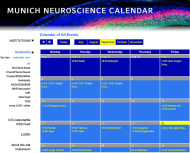Master students: Programmer position in Neuroscience
Klinikum der Universität München, Institute for Stroke and Dementia Research
10.12.2014
 About ISD:
About ISD:
The ISD (photo), located in the biomedical science campus, is a member of the DFG‐funded “Synergy” Cluster of Excellence with various institutions in Munich and also a part of the Graduate School of Systemic Neurosciences.
About the lab:
The lab at ISD has a state of the art infrastructure including: brand new fully equipped lab and offices, a state of the art animal facility that is fully equipped with surgery rooms, a recently purchased in-house 2-photon microscope (Zeiss 7P), a Leica SP8 confocal microscope, a Lavision Biotec light-sheet microscope, a behavioral test unit, a surgery room and a post-operative care unit, a new PALM Microbeam 4.0 laser micro-dissection microscope, and epifluorescence microscopes.
The Ertürk lab explores critical cellular and molecular mechanisms underlying neurodegenerative diseases, in particular brain injury. To this end, we map the mouse brain using various cutting-edge techniques to assess brain function and structure including in vivo 2-photon imaging, optogenetics, high resolution 3D imaging of the entire brain - that we recently developed (photo published as covers in Nature Medicine (Erturk et al. 2012) and Nature Protocols (Erturk et al. 2012)), and rabies virus tracing of neuronal networks.
You are:
- curious about basic science and carry a great interest to make breakthroughs,
- always looking for solutions to turn great ideas and opportunities into actions,
- always willing to learn, and have the courage to ask questions when you don’t know,
- open to express your opinions and receive feedbacks / critics,
- a team player and willing to work in a collaborative environment to share ideas and experiences,
- willing to be part of a diverse team to make a dent in the universe.
The position:
The research focuses on developing imagine analysing algorithms to explore mechanisms leading to chronic neurological problems (e.g. Alzheimer’s disease, epilepsy and neuropsychiatric disorders). The specific projects will involve usage of programing (Matlab, Python, Perl, C++ or equivalent and special imaging software) to map the mouse brain from the data obtained by 3D imaging of cleared transparent brains. Hence, ideal candidates should have a very good knowledge in programming to develop algorithms for image analysis. Working knowledge of basic statistics is compulsory, advanced statistics (e.g. Bayesian analyses, machine learning) would be preferable. We also offer opportunities to develop your skills further, for example in programming or advance microscopy techniques including 2-photon imaging and light-sheet microscopy.
The position is intended to be for 6 months (such as for Master students, Praktikum or Studentische Hilfskraft) and extension is possible.
Applications:
Applicants should submit their complete application documents as pdf (including CV, motivation letter, publication list and 2 references or the contact info of at least 2 referees) via email to:
To Ms. Jasmin Gezgin on behalf of Dr. Ali Ertürk
jasmin.gezgin@med.uni-muenchen.de
Institute for Stroke and Dementia Research (ISD) Heiglhofstr. 55
81377 Munich| Germany





